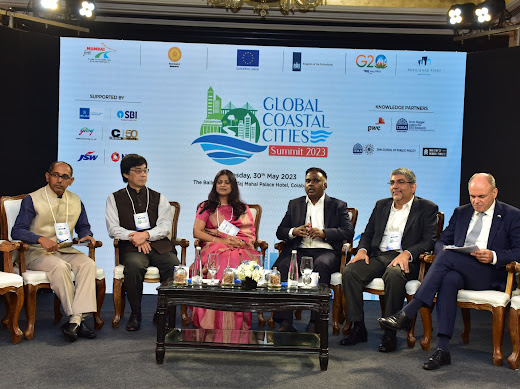Climate change rising temperature and sea levels are posing new risks for coastal cities. With population growth rate of 1%- 2% in India every year, Mumbai too is growing and is population will double from 20 million to 40 million in the coming years. The city is also at the risk of rising sea level. It needs infrastructure, housing, roads with future thinking accommodating its eco system through collective efforts from all.
P Velrasu, additional commissioner, BMC, said due to climate change, rising sea levels annual flooding and air pollution in Mumbai, at BMC, they are taking the issue very seriously and have published a Climate Action Plan (MCAP). Starting next year, BMC will also publish a separate budget detailing their expenses on such issues.
Velrasu was speaking at Global Coastal Cities, 3rd International Summit, organised by Mumbai First.
Rising sea level is going to affect Asian countries much more as compared to other nations, 550 cities will be affected, he said. Underlining the seriousness and urgency to protects assets around sea, Velrasu said, “It is very important and urgent to have long term asset plans with engineering interventions and not merely keep it have it as an academic exercise. Coastal Mumbai will need more interventions as compared to eastern side which has mud flats.”
Learning lessons and adopting best practices of other countries, Velrasu said, on the lines of Tokyo, at BMC, they have constructed three underground water pumps and tanks at flooding spots of Milan Subway, Hindmata and Gandhi Market in Sion. Water pumps a Hindmata and Gandhi Market were made functional last year while Milan Subway will be fully functional this monsoon. He explained that pumps carry excess rain water from collection area into tanks through a pipeline network and after monsoon this water is released into the sea via stormwater drains.
With flood management, discussions are underway on coastal as well as inland management. Especially with regards to the Mithi river, BMC is opting for massive floodgate pump technology being used in South Korea, Japan and Germany, Velrasu said. Massive gate pumps will be located at multiple locations to protect inland from high-tide for which the BMC will be coming out with these tenders in another two-three months, he said.
He added that factoring climate change and rising sea levels for the Coastal Road also, 250 acres of green belt will be coming up within one or two years.
Making a case in point he said, “We are sitting in the Taj Hotel, which itself could be underwater during floods in 2050 – at least the basement of the hotel. That’s scary. Certain hard interventions will have to be made.” Climate change does not require massive fund requirement or scientific solutions, Velarasu said, adding that instead area specific solutions are needed with right policy tweaks. As an example, he said, the Development Control and Promotion Regulation Rules (DCPR 2034) themselves can be redrawn to include a complete sustainability roadmap. “But the political leadership needs to be ready to make some very radical decisions in this regard.”
Former BMC commissioner Praveen Pardeshi said that climate change is a huge opportunity to provide homes to all 50% slum inhabitants in Mumbai.
He said due to land scarcity, Mumbai can only grow vertically. “As per the Development Plan, 70% of Mumbai land is non buildable and only 30% land is buildable, which is good,” he said.
As an example he said, according to Maharashtra Regional and Town Planning Act 1966, buildings along Marine Drive have small open spaces around them, which are useful to no one except for personal comfort of rich people living there, at the cost of those who are living in slums. Most of the DP 2034, he said has collapsed all private open spaces and converted them into private vertical buildable areas and expanded public spaces streets and footpaths.
“With 50% people in Mumbai living in slums we have to convert many private open spaces for homes for the poor by providing FSI in slum rehabilitation with required infrastructure. This can happen around metro corridors,” he said, adding that it is important to encourage more and cheaper public transport to reduce carbon emissions.
Pardeshi, who is the CEO of state think tank, Maharashtra Institute of Transformation (MITRA), while speaking on Mumbai’s water requirements said that the rate at which the city’s population is growing, its water needs cannot be met by creating more dams. “We have to find a way to utilise rainwater. The bulk demand for non-drinking purposes has to come from recycling treated wastewater. I don’t see any other way for the city. Technology needs to tackle tomorrow’s problems. Rivers and surplus water needs to be taken underground. Thankfully the construction of sewage treatment plants has finally commenced,” he said.
He pointed out that in Mumbai, climate change will impact health with very high non-communicable diseases like diabetes, hypertension, especially in slums and it needs to be controlled.
Narinder Nayar, chairman, Mumbai First, said at present with multiplicity of agencies in Mumbai, the city needs a single governing body in the form of a CEO or administrator and requires political will.
The summit was jointly organised by Mumbai First, the Government of Maharashtra, European Union, and the Consulate General of the Netherlands.
The speakers included bureaucrats, diplomats, climate scientists, policymakers, urban planners and private sector stakeholders who said that scientists, engineers, local administration needs to share data on how much sea levels will rise in local context.

